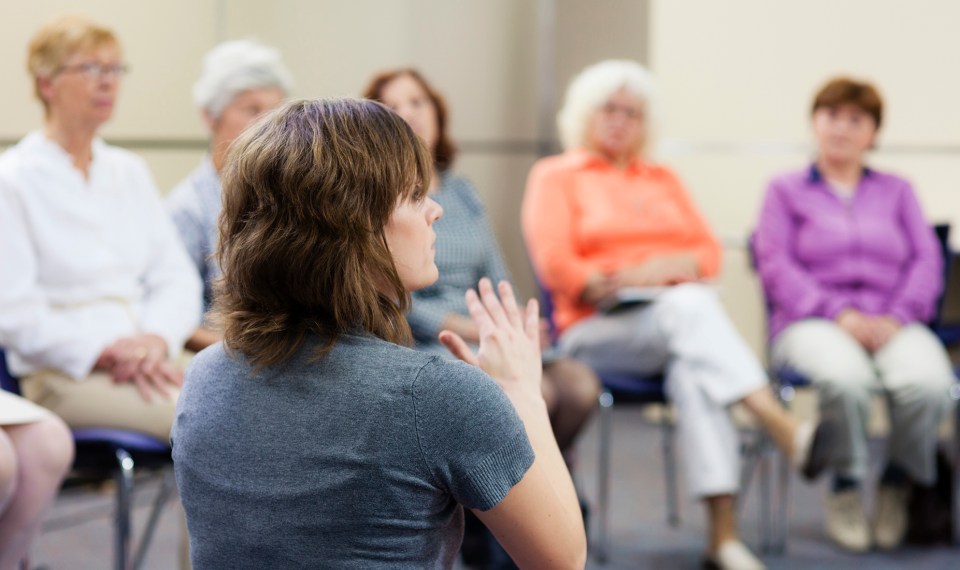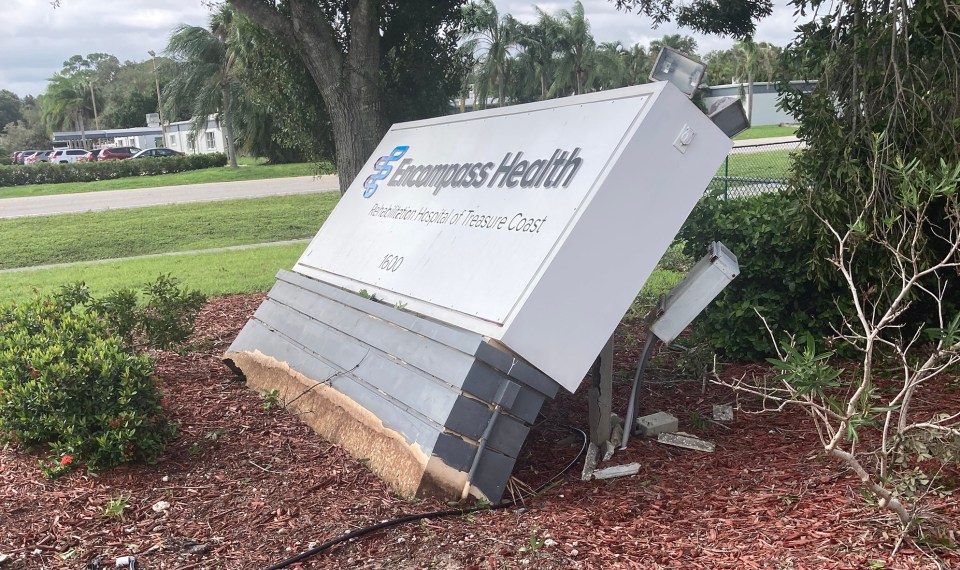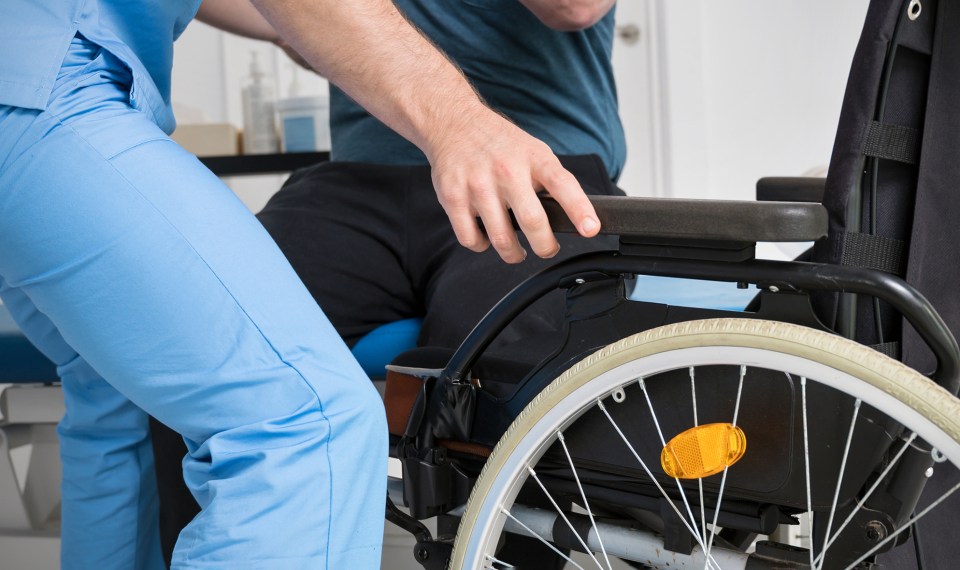Support groups are an essential part of the recovery process, especially following a new diagnosis that can alter an individual’s lifestyle and their participation in daily activities. Support groups offer numerous benefits to participants, whether it is the person with the illness or injury or their family member or caregiver.
Benefits of participating in support groups include:
- Problem-solving and learning up-to-date information and innovative technologies
- A feeling of community and being around others going through similar experiences
- Safe environment to share truthful information, experiences, advice and encouragement
- Learning how to navigate a new normal with peer support
- Feedback from others to improve function, independence and quality of life
While helping your patients connect to support groups in your area may not always be a priority, it could be the extra support they need in their recovery. At Encompass Health rehabilitation hospitals, support groups are an integral part of recovery both during and after a patient’s stay.
The suppport groups are typically condition focused and facilitated by onsite clinicians, often an occupational therapist. Both the patient and their caregiver are invited to participate. Discussions are focused on the group’s priorities and suggestions and could include guest speakers and community events or activities.
In the following interviews, support group participants discuss the benefits of support groups as it related to their ongoing recovery and quality of life.
Parkinson’s Support Interview No. 1
Conducted by Milena Maragos, Occupational Therapist
Participants of the Encompass Health Rehabilitation Hospital of Greenville’s Parkinson’s support group were questioned on how they felt about being around others going through similar experiences. Comments included:
- “Eye-opener”
- “Receive realistic information”
- “Enjoy the smaller group atmosphere because it is easier to share”
- “We become a family, and families reach out and help each other”
- “Positive atmosphere”
The Parkinson’s support group members said the group improves their overall quality of life as they learn up-to-date information and advice to apply in their daily routine, adding that they look forward to the gatherings and seeing each other every month.
Participants said their favorite part of the support group is:
- “The facilitator and people who are a part of it”
- “The fellowship”
- “Individualized and specific information we are looking for”
- “We are all on an individual journey, but all together”
Susan Cromer said the support group helps her as a caregiver to someone with Parkinson’s. “It is good to have a group and sit together and share everything, knowing that the others know what you are going through,” she said. “We can talk freely, understand and problem solve through things together. I love this support group and look forward to it every month.”
Parkinson’s Support Group Interview No. 2
Conducted by Kara Norton, Occupational Therapist
Martha Fitts, a former patient and current member of the Parkinson’s support group at Encompass Health Rehabilitation Hospital of Jonesboro in Arkansas was interviewed to explore what the support group means to her. She shared the following:
- “It is one of my valuable tools that helps me live with the best quality of life on my Parkinson’s journey.”
- “It is comforting to be around other Parkinson’s people, sharing our experiences and concerns with similar challenges.”
- “Often in my daily walk of life, a new challenge appears, and I am reminded of topics we have discussed to help accomplish my daily activities.”
She added that partaking in the support group helps improve her overall quality of life. “I love having a scheduled Parkinson’s meeting and look forward to seeing my friends and leaders who have our best interest at heart,” she said. “The education, motivation, encouragement and comradery help reduce my anxiety and depression on my Parkinson’s journey.”
She said she would highly recommend a support group for someone with Parinson’s or other debilitating conditions: “Of course, I frequently recommend that people come to the support group and will continue to do so,” she said.
Amputee Support Group Interview No. 1
Conducted by Josh Millon, Occupational Therapist
Neil Motter, a bilateral leg amputee, is a member of the amputee support group at Encompass Health Valley of the Sun in Arizona. He regularly attends meetings accompanied by his wife, Karen. Neil said involvement in the amputee support group has benefited him “beyond measure,” and he “would not be where he is today without the support group.”
Neil recalled an interaction with a new participant. He said he recognized the look on his face and knew exactly what the other person was feeling. Thanks to his involvement with the support group, Neil said he knew what he needed to say to help him.
He said the group makes him feel supported and has positively impacted his quality of life. “Without the support group, you have nowhere to go, no one to turn to when you’re down or going through a problem,” he said. “You’re able to turn to this group to get help, and in turn, help someone else.”
Neil remembers how encouraging it was to see another bilateral leg amputee and all they had accomplished early in his recovery. He hopes to be that example and give others hope and something to strive for. He recognizes his ability to connect with others, having also gone through this experience himself.
When attending the amputee support group as an inpatient prior to discharge, Neil said it showed him the importance of these groups early in his recovery. Karen said it’s helped her by introducing her to other caregivers and spouses who are experiencing similar situations.
Now as a more seasoned member of the group, she is happy to provide help and support to newer members.
Amputee Support Group Interview No. 2
Conducted by Josh Millon, Occupational Therapist
During his inpatient stay shortly after his amputation, Ken Meyer was invited to attend Encompass Health Valley of the Sun’s support group at a barbecue cookout event hosted by the group. He heard stories from participants who had progressed quickly to using prosthetics and was encouraged by their success. He now attends the support group almost every month and remains inspired by others’ stories.
Some of the benefits he has experienced include:
- The support group activities (no matter what they are) are fun, and he enjoys getting to interact with others going through similar experiences.
- He looks forward to and is inspired by the innovative technologies and prosthetic advancements that he is exposed to as part of the group when learning from guest speakers.
- He has had the opportunity to attend individualized leisure events (Example: He tried out a new type of prosthetic to see if he wanted to pursue running at an adaptive running clinic).
- He has made many friends and meets new people each meeting.
- He can relate to others’ stories during the group sessions.
- He sees the group as something to look forward to and enjoys socializing with others.
“There is no negative to joining a support group; everyone is there is in a situation like yours,” he said. “Getting out and being with other people is half of the medicine you need. You get to hear the advice and experiences of other people that can be helpful to you”.
Thanks to the group, Ken attended a golf clinic and realized he could still play golf, which improved his confidence and quality of life.
Since his amputation, Ken has traveled cross-country as well as to Europe and shared many positive and inspiring stories during the support groups to provide hope and encouragement to other participants.
Stroke Support Group Interview No. 1
Conducted by Laura McGinnis, Occupational Therapist
Lori Wright, a stroke survivor of 24 years and member of the stroke support group at Encompass Health Rehabilitation Hospital of Henderson in Nevada said the first thing she did after her condition stabilized was find a support group, and she is glad she did.
She said she enjoyed learning from other stroke survivors. Now, she is sharing her experiences and tips she has learned over the years.
Lori recalled meeting another woman in the initial stages of her stroke recovery. The woman told Lori how she was worried about interacting with her grandchildren post-stroke.
Lori was able to help and explain the activities she has done with her grandchildren, such as playing games and teaching them simple money management. These are excellent ways to work on fine motor coordination and thinking skills while engaging with her family and working on the impairments she experienced after her stroke. Lori helped to ease the woman’s worries as she was preparing to return home from her stay at Encompass Health.
Lori said by attending a stroke support group, she also built confidence related to navigating the community, so she could attend shows and movies outside of her home. “I think it is very important for stroke survivors to come to a meeting, so they can prove to themselves they can get out and do the things they love to do,” she said.
Stroke Support Group Interview No. 2
Conducted by Isabella Comeau, Occupational Therapist
Vicki Weakly was a former UVA Encompass Health Rehabilitation Hospital patient and now works at the hospital and attends the monthly stroke support group.
“Being a part of a support group helps remind me I do not have to suffer in silence,” she said. “Before my support group, I doubted the level of progress I could make and was afraid to speak out about how I was feeling. Listening to others share in their recovery process is very encouraging and hopeful.”
Improving Functional Outcomes and Quality of Life
After conducting several interviews with varying support groups, participants agreed that support groups allowed them to become more involved in their day-to-day activities, socialization and community with improved confidence, satisfaction and independence.
Occupational therapy practitioners (OTPs) strive to assist their clients to become more independent in endeavors, or occupations, of their choosing, and recognize the connection between an individual’s experience of well-being and their overall health.
The Occupational Therapy Practice Framework Domain and Process defines occupations as “the things people need to, want to, and are expected to do.” It describes social participation as a subcategory of occupations.
Whether a participant is someone with a specific condition or a caregiver or family member, a successful support group assists in improving participants’:
- Involvement
- Socialization
- Peer networking
- Hope
- Awareness of relevant information and technologies
- Coping skills
- Mental health
- Physical health
- Daily activity participation and independence levels
- Engagement in meaningful and leisure activities
- Satisfaction and quality of life
All of these factors improve the quality of life and can help patients in their ongoing recoveries.
References:
Occupational therapy practice framework: Domain and process—Fourth edition. (2020). The American Journal of Occupational Therapy, 74 (Supplement_2). https://doi.org/10.5014/ajot.2020.74s2001)
The content of this site is for informational purposes only and should not be taken as professional medical advice. Always seek the advice of your physician or other qualified healthcare provider with any questions you may have regarding any medical conditions or treatments.



